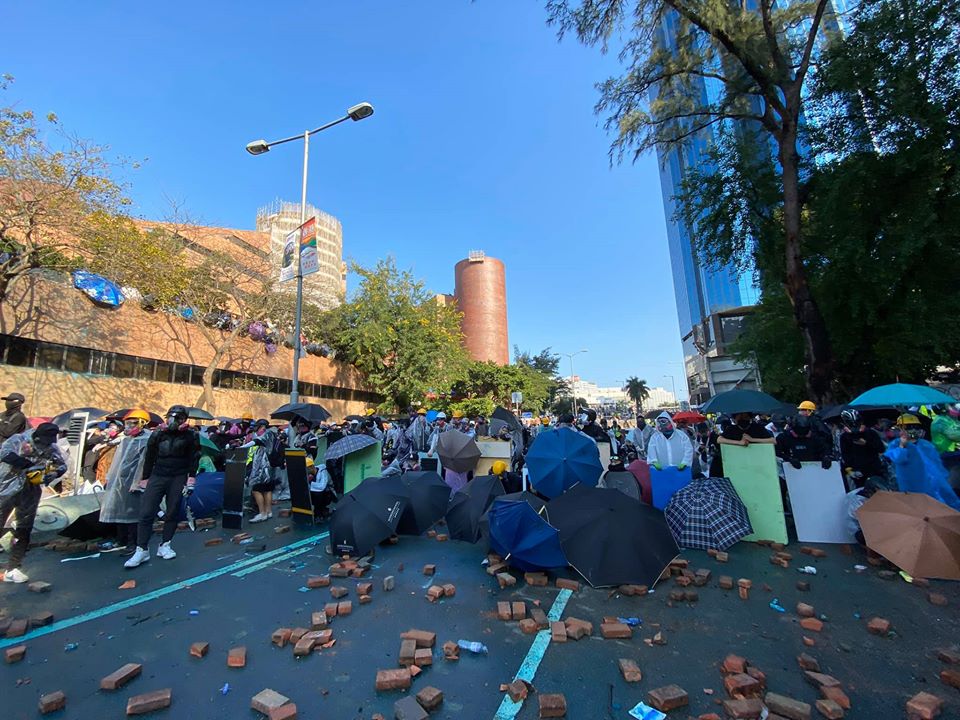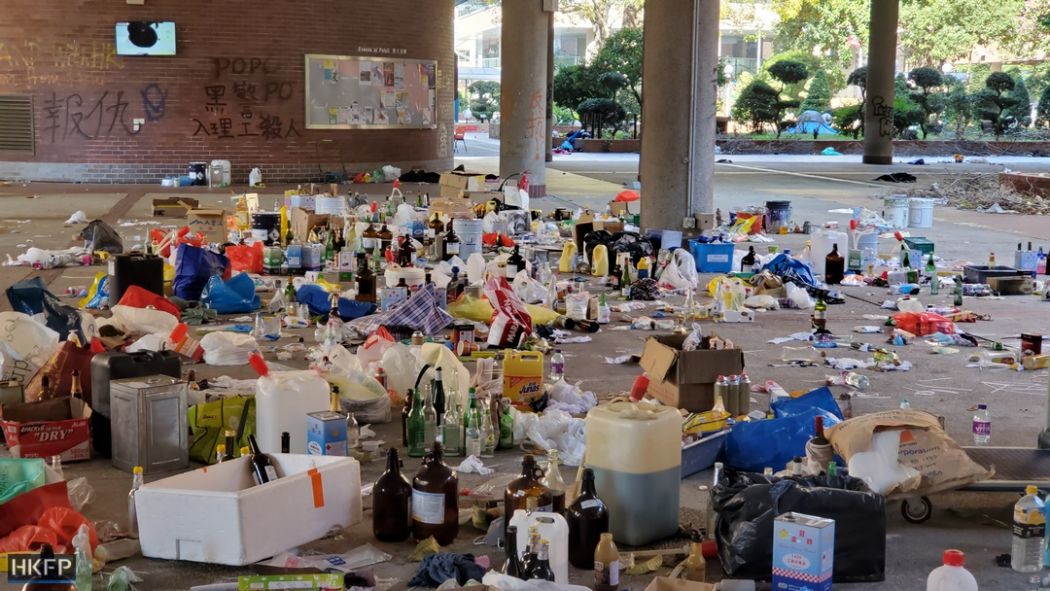Nine people have been sentenced – including two to a training centre – after being convicted of rioting at Hong Kong Polytechnic University (PolyU) during the 2019 protests and unrest.
Handing down the sentences on Saturday, District Court Judge Josiah Lam said the defendants – aged between 20 and 29 – had chosen the wrong way to express their hopes for changes in society.

Seven defendants – Nelson Chan, Kong Keng-tong, Wong Sik-chit, Leung Ka-sing, Tsang Sin-yee, Tang Kam-lok and Jim Lung-heung – were jailed for between 38 and 40 months each.
The two other defendants, Chan Ting-kwan and Chan Kwok-wai, who were aged 17 and 18, respectively, at the time of the offence, were sent to a training centre where the minimum period of detention is six months and the maximum is three years.
The group was found guilty last month of rioting near PolyU in Hung Hom on November 18, 2019.
The university siege, which occurred during the height of the 2019 protests, saw protesters and riot police clash in a tense stand-off that lasted nearly two weeks and made headlines worldwide. Thousands of young protesters, some under 18, barricaded themselves within the university’s walls surrounded by police at all exits.

Some patrolled the outskirts, hurling fire bombs and shooting arrows at riot police outside, who responded with tear gas, water cannons and pepper bullets and arrested anyone who tried to escape.
The chaos left more than 300 people hospitalised and over 1,300 arrested.
‘A serious crime’
Addressing the court, Lam said that the riot in question took place along Gascoigne Road in Yau Ma Tei, where protesters allegedly hurled petrol bombs towards a police cordon. Officers began their clearance operation at 1:15 p.m. and by 1:33 p.m. the protesters had largely moved on.

Lam said that the gear the defendants were wearing suggested that they had come prepared. But he said the riot was small in scale and lacked comprehensive planning, and besides some fires set in the road and in plant pots, there was no significant property damage or injuries to police officers.
However, he said a deterrent sentence was needed as rioting is a serious crime regardless of the scale of the incident.
“But the court should refrain from an overly heavy sentence. Otherwise, it might create a crushing effect on the youth, who after all need to re-enter society ultimately,” Lam said.

The judge took a sentencing starting point of 42 months, adding two months for Chan Ting-kwan, who Lam said played a leadership role, and Tsang Sin-yee, who lit a fire before running away. Taking into account the fact that none of the defendants had a criminal history, Lam reduced all of the sentences by four months.
See also: In Pictures: Hong Kong PolyU ‘still besieged’ a year after violent campus protests
Campus clashes
Hong Kong was rocked by months-long demonstrations in 2019, when protesters took to the streets to oppose a controversial extradition bill that would allow suspects to be sent to mainland China for trial. By the time the bill was shelved in September, the protests had grown into a wider pro-democracy movement against Beijing’s perceived overreach and alleged police misconduct.

Over the months, university campuses emerged as flashpoints for clashes between protesters – many of them students – and police. A week before the PolyU occupation, violent protests broke out at Chinese University of Hong Kong (CUHK) in Sha Tin, where demonstrators attempted to paralyse a major expressway by hurling objects and petrol bombs to obstruct traffic.
In October last year, five former CUHK students were sentenced to close to five years in prison after they were convicted of rioting. The district court judge likened the scene of the stand-off to a “war zone.”
Some 10,200 people were arrested in relation to the 2019 protests. The demonstrations disappeared from the streets in 2020 due to Covid-19 social distancing measures and the national security law, which broadly criminalises acts including subversion and collusion with foreign forces.
Support HKFP | Policies & Ethics | Error/typo? | Contact Us | Newsletter | Transparency & Annual Report | Apps
Help safeguard press freedom & keep HKFP free for all readers by supporting our team

LATEST FROM HKFP
HKFP has an impartial stance, transparent funding, and balanced coverage guided by an Ethics Code and Corrections Policy.
Support press freedom & help us surpass 1,000 monthly Patrons: 100% independent, governed by an ethics code & not-for-profit.










